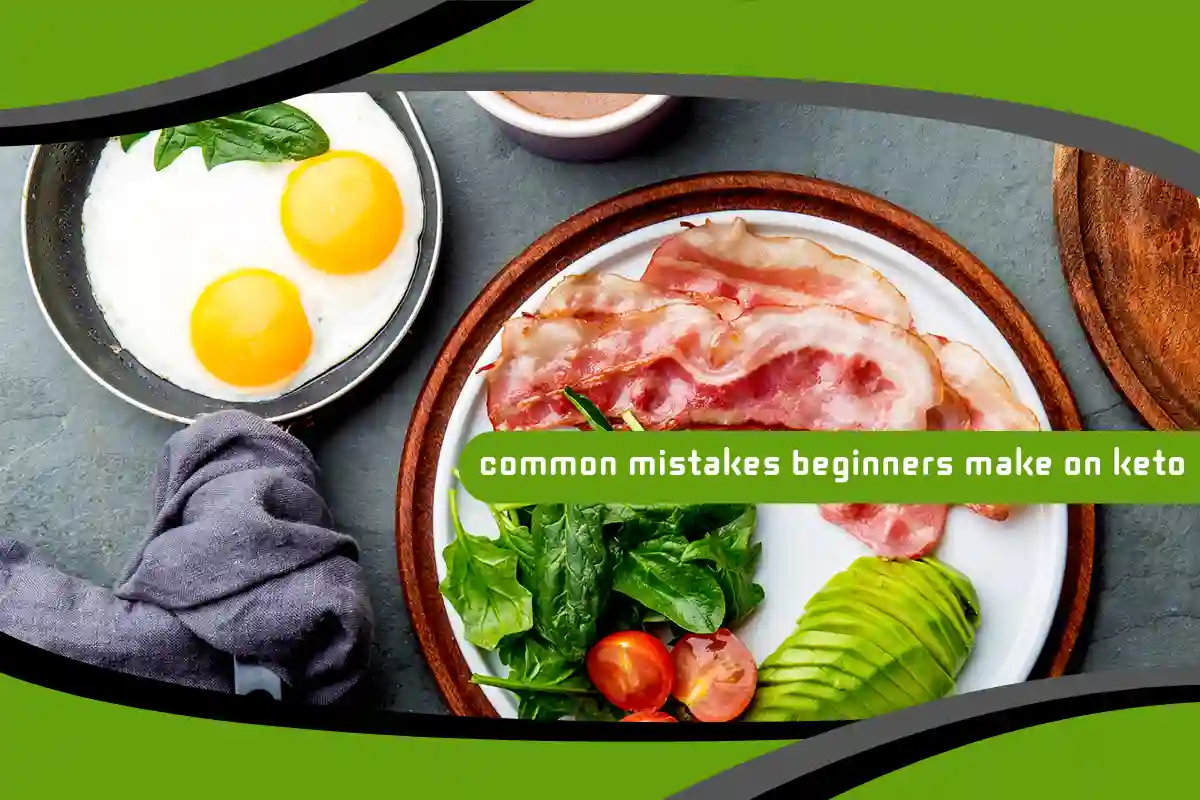The ketogenic diet has gained immense popularity in recent years for its potential benefits in weight loss, improved energy levels, and better mental clarity. However, many beginners find it challenging to adapt to this lifestyle, often making mistakes that hinder their progress. Understanding the common missteps is crucial to ensure a smoother transition into keto and a more successful journey. In this article, we will explore the top mistakes beginners make on keto and how to avoid them, helping you stay on track and achieve your goals.

Not Understanding the Basics of Keto
One of the most common mistakes beginners make is not fully understanding the core principles of the ketogenic diet. Keto is centered on reducing carbohydrate intake and increasing fats to shift your body into ketosis, where it burns fat for energy instead of glucose. Without a clear understanding of how this process works, it’s easy to make misinformed decisions about food choices, portion sizes, and overall diet structure.
Underestimating the Importance of Macros
Many beginners fail to monitor their macronutrient intake properly. While focusing on reducing carbs is essential, it’s equally important to balance fats and proteins. Too much protein can kick you out of ketosis, while not enough fat may leave you feeling hungry or lacking energy. It’s crucial to track your macros to ensure you are staying within the optimal range for ketosis.
Consuming Too Many Carbs
A key element of the keto diet is drastically reducing carbohydrate intake, often to less than 20-50 grams per day. Beginners often mistakenly consume more carbs than they realize, thinking foods like certain vegetables, fruits, or dairy are keto-friendly in larger quantities. This can easily prevent the body from entering or maintaining ketosis. Learning to read food labels and track carbs is vital.
Not Getting Enough Fiber
Fiber is an essential nutrient, and many beginners on keto forget to incorporate enough fiber-rich foods into their diet. While keto limits many high-carb foods, there are still plenty of low-carb, high-fiber options like leafy greens, avocados, and chia seeds. Neglecting fiber can lead to digestive issues such as constipation, which is a common complaint among those new to keto.
Watch also: How to Track Your Macros on a Keto Diet: The Ultimate Guide for Success
Overeating Protein
While protein is an important macronutrient on keto, overeating it can be a mistake. Excessive protein can lead to gluconeogenesis, where the body converts protein into glucose, potentially knocking you out of ketosis. It’s important to consume the right balance of fats, proteins, and carbs to remain in a state of ketosis.
Not Drinking Enough Water
The ketogenic diet has a diuretic effect, which means your body tends to lose more water than usual. This can lead to dehydration if you’re not diligent about your water intake. Beginners often overlook the need for hydration, leading to symptoms like headaches, fatigue, and muscle cramps. Drinking enough water is essential to keep your body functioning optimally while on keto.
Ignoring Electrolytes
In addition to water, electrolytes like sodium, potassium, and magnesium are crucial on a keto diet. As you lose water weight, you also lose important electrolytes, which can result in symptoms such as muscle cramps, dizziness, and fatigue. Beginners often forget to replenish these electrolytes, leading to what is commonly known as the “keto flu.”
Not Planning Meals in Advance
Meal planning is a critical aspect of succeeding on keto, yet many beginners neglect this step. Without a meal plan, it’s easy to fall back on carb-heavy foods or get tempted by quick convenience foods. Preparing your meals in advance ensures you have the right keto-friendly options on hand, making it easier to stick to the diet and avoid unnecessary slip-ups.
Skipping Healthy Fats
While it’s easy to focus on cutting carbs, beginners often make the mistake of not consuming enough healthy fats. Healthy fats are vital on keto as they provide the energy your body needs while in ketosis. Skipping fats can lead to feelings of fatigue and hunger. Including sources like olive oil, avocados, nuts, and fatty fish will ensure you get the necessary fats to sustain ketosis.
Expecting Immediate Results
Keto is not a quick-fix diet, and expecting immediate results is one of the most common mistakes beginners make. While some people may experience rapid weight loss in the first week, sustainable results take time. It’s important to set realistic expectations and be patient with your progress, understanding that keto is a long-term lifestyle change.
Not Tracking Ketosis Progress
Beginners often fail to track their progress in terms of ketosis. Without measuring ketone levels through urine strips, blood meters, or breath analyzers, it’s difficult to know whether you are in ketosis. Regular testing will help you adjust your diet if necessary and stay on track toward your goals.
Overlooking Hidden Carbs in Processed Foods
While many processed foods are marketed as keto-friendly, they often contain hidden carbs in the form of sugars, starches, or additives. Beginners tend to overlook ingredient lists and make the mistake of consuming foods that are not truly keto-approved. Always check food labels thoroughly to ensure they align with the principles of the ketogenic diet.
Not Getting Enough Sleep
Sleep is an often overlooked aspect of health on the keto diet. Not getting enough quality sleep can hinder your body’s ability to stay in ketosis and may contribute to weight gain. Beginners frequently underestimate the importance of sleep, but adequate rest is necessary for your body to function properly, repair, and maintain hormonal balance during the keto journey.
Watch also: Net Carbs vs Total Carbs: Understanding the Key Difference for Your Low-Carb Diet
Relying Too Much on Processed Keto Snacks
Keto snacks, like keto bars and chips, are convenient, but relying on them too heavily is a mistake. Many processed keto products are high in unhealthy fats, additives, and artificial sweeteners, which can affect your long-term health. It’s important to focus on whole, nutrient-dense foods like vegetables, meats, and healthy fats rather than overloading on processed snacks.
Failing to Adjust Portion Sizes
Portion control is crucial when following the keto diet. Beginners often assume that they can eat unlimited amounts of keto-approved foods without considering portion sizes. While keto allows for more flexibility, it’s still important to be mindful of portions to avoid overeating, which could hinder your weight loss or ketosis goals.
Not Incorporating Physical Activity
Physical activity is a key component of any healthy lifestyle, and the keto diet is no exception. Many beginners make the mistake of neglecting exercise, thinking they can lose weight simply by following the diet. Regular physical activity, including strength training and cardio, will help you maximize the benefits of keto and enhance fat-burning.
Comparing Progress to Others
Every person’s body reacts differently to the keto diet, and comparing your progress to others can be discouraging. Beginners often make the mistake of expecting their experience to mirror someone else’s, leading to unnecessary frustration. Focus on your own progress and celebrate small wins along the way, rather than comparing yourself to others.
Not Being Patient with Adaptation
The transition to keto, known as the “keto adaptation period,” can take time. Beginners often expect to feel great immediately, but it can take several weeks for your body to fully adapt to burning fat for fuel. During this period, you may experience symptoms like fatigue or irritability, but patience is key as your body adjusts.
Not Seeking Professional Guidance
Finally, many beginners fail to seek professional guidance when starting keto. Consulting a nutritionist or dietitian can help you avoid common mistakes and create a plan tailored to your unique needs. This can be especially beneficial for those with underlying health conditions or specific dietary requirements.
Conclusion: Staying on Track for Long-Term Success
Avoiding common mistakes on the keto diet can help you achieve lasting success. By understanding the principles of keto, tracking your macros, staying hydrated, and being mindful of your food choices, you can navigate the challenges of the diet with ease. Remember, keto is a lifestyle change, not a quick fix, and with patience and dedication, you can experience the many benefits it offers.
Watch also: Signs of Ketosis: How to Know You’re in Ketosis and What to Expect



No comment